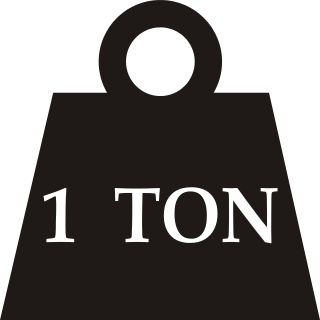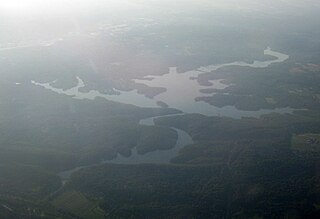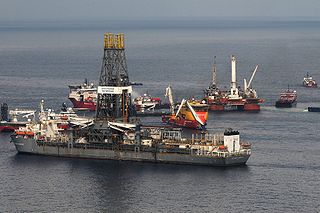
Propane is a three-carbon alkane with the molecular formula C3H8. It is a gas at standard temperature and pressure, but compressible to a transportable liquid. A by-product of natural gas processing and petroleum refining, it is often a constituent of liquefied petroleum gas (LPG), which is commonly used as a fuel in domestic and industrial applications and in low-emissions public transportation; other constituents of LPG may include propylene, butane, butylene, butadiene, and isobutylene. Discovered in 1857 by the French chemist Marcellin Berthelot, it became commercially available in the US by 1911. Propane has lower volumetric energy density than gasoline or coal, but has higher gravimetric energy density than them and burns more cleanly.

Ton is any of several units of measure of mass, volume or force. It has a long history and has acquired several meanings and uses.

Starbucks Corporation is an American multinational chain of coffeehouses and roastery reserves headquartered in Seattle, Washington. It was founded in 1971, and is currently the world's largest coffeehouse chain.

Mineral oil is any of various colorless, odorless, light mixtures of higher alkanes from a mineral source, particularly a distillate of petroleum, as distinct from usually edible vegetable oils.

Water conservation aims to sustainably manage the natural resource of fresh water, protect the hydrosphere, and meet current and future human demand. Water conservation makes it possible to avoid water scarcity. It covers all the policies, strategies and activities to reach these aims. Population, household size and growth and affluence all affect how much water is used.

Cha chaan teng, often called a Hong Kong-style cafe or diner in English, is a type of restaurant that originated in Hong Kong. Cha chaan teng are commonly found in Hong Kong, Macau, and parts of Guangdong. Due to the waves of mass migrations from Hong Kong in the 1980s, they are now established in major Chinese communities in Western countries such as Australia, Canada, the United Kingdom, and the United States. Likened to a greasy spoon cafe or an American diner, cha chaan tengs are known for eclectic and affordable menus, which include dishes from Hong Kong cuisine and Hong Kong-style Western cuisine. They draw comparisons to Western cafés due to their casual settings, as well as menus revolving around coffee and tea.

The Southern Nevada Water Authority (SNWA) is a government agency that was founded in 1991 to manage Southern Nevada's water needs on a regional basis in Clark County.

Dresden Generating Station is the first privately financed nuclear power plant built in the United States. Dresden 1 was activated in 1960 and retired in 1978. Operating since 1970 are Dresden units 2 and 3, two General Electric BWR-3 boiling water reactors. Dresden Station is located on a 953-acre (386 ha) site in Grundy County, Illinois, at the head of the Illinois River, near the city of Morris. It is immediately northeast of the Morris Operation—the only de facto high-level radioactive waste storage site in the United States. It serves Chicago and the northern quarter of the state of Illinois, capable of producing 867 megawatts of electricity from each of its two reactors, enough to power over one million average American homes.

The Energy Policy Act of 2005 is a federal law signed by President George W. Bush on August 8, 2005, at Sandia National Laboratories in Albuquerque, New Mexico. The act, described by proponents as an attempt to combat growing energy problems, changed US energy policy by providing tax incentives and loan guarantees for energy production of various types. The most consequential aspect of the law was to greatly increase ethanol production to be blended with gasoline. The law also repealed the Public Utility Holding Company Act of 1935, effective February 2006.
Water supply and sanitation in Singapore are intricately linked to the historical development of Singapore. It is characterised by a number of outstanding achievements in a challenging environment with geographical limitations. Access to water in Singapore is universal, affordable, efficient and of high quality.
Kelvin Tan Wei Lian is a Singaporean former Mandopop singer who earned a living as a busker before he won the first edition of Project SuperStar in 2005. He has released three albums, All I Want Is... (2006), i-Weilian (2007) and Moving Notes...Kelvin Tan (2009). He also had a solo concert at the Singapore Expo, lead a choir at the opening ceremony at the 2008 Summer Paralympics, and singing Singapore's 2009 National Day Parade's theme song.

A paper cup is a disposable cup made out of paper and often lined or coated with plastic or wax to prevent liquid from leaking out or soaking through the paper. It may be made of recycled paper.

In common usage, a scoop is any specialized spoon used to serve food.

The Loch Raven Reservoir is a reservoir that provides drinking water for the City of Baltimore and most of Baltimore County, Maryland. It is fed by the Big Gunpowder Falls river, and has a capacity of 23 billion US gallons (87,000,000 m3) of water.
The Portland Water Bureau is the municipal water department for the city of Portland in the U.S. state of Oregon. The bureau manages a water supply that comes mainly from the Bull Run River in the foothills of the Cascade Range east of the city and secondarily from the Columbia South Shore Well Field near the Columbia River. As of 2023, Mingus Mapps was the city commissioner in charge of the bureau, and the chief administrator is Michael Stuhr. Budgeted departmental revenues for fiscal year 2015–16 included about $157 million for charges for services.

Rivelin Dams are a pair of water storage reservoirs situated in the upper part of the Rivelin Valley, 5 miles (8 km) west of Sheffield in South Yorkshire, England. The dams are owned by Yorkshire Water and provide water to 319,000 people as well as compensation water for the River Rivelin. They are named Upper and Lower and fall just within the eastern boundary of the Peak District.

The 1980 Amherst, Massachusetts, water shortage was a water crisis in Amherst, Massachusetts, that amongst other impacts, also led to the closure of University of Massachusetts Amherst for three days from September 4, 1980, until September 8, 1980. Since 1965, communities across the state were experiencing water crises of their own. This was the region's worst drought.

The Deepwater Horizon oil spill occurred between 10 April and 19 September 2010 in the Gulf of Mexico. A variety of techniques were used to address fundamental strategies for addressing the spilled oil, which were: to contain oil on the surface, dispersal, and removal. While most of the oil drilled off Louisiana is a lighter crude, the leaking oil was of a heavier blend which contained asphalt-like substances. According to Ed Overton, who heads a federal chemical hazard assessment team for oil spills, this type of oil emulsifies well. Once it becomes emulsified, it no longer evaporates as quickly as regular oil, does not rinse off as easily, cannot be broken down by microbes as easily, and does not burn as well. "That type of mixture essentially removes all the best oil clean-up weapons", Overton said.

A disposable cup is a type of tableware and disposable food packaging. Disposable cup types include paper cups, plastic cups and foam cups. Expanded polystyrene is used to manufacture foam cups, and polypropylene is used to manufacture plastic cups.
Blackburn power stations are a series of electricity generating stations that have provided electric power to the town of Blackburn and the wider area from 1895 to the present. The first station in Jubilee Street, Blackburn began operating in 1895. A new larger station known as Blackburn East or Whitebirk power station was commissioned in 1921 and was rebuilt in stages over the period 1942 to 1955. Whitebirk station closed in 1976. The 60 MW Blackburn Mill Combined Cycle Gas Turbine (CCGT) power station has generated electricity since 2002. The Blackburn energy from waste (EfW) plant is currently (2020) being planned.
















